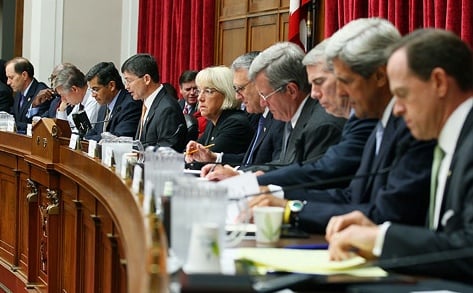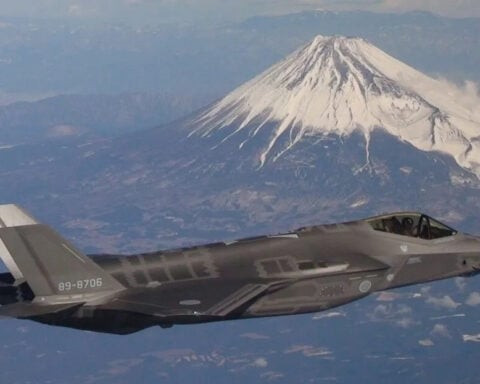Despite billions of dollars being raised and spent during the 2012 election cycle, last Tuesday changed very little in terms of the balance of power. Control of the House, Senate and White House remains the same, though Democrats picked up a handful of seats in Congress and the names and faces on the four defense committees also will be reshuffled in the next session. Still, there is a long list of priorities to be taken care of before the new Congress is sworn in at the beginning of January. Here are some of the biggest items in the national security arena:
Sequestration
What it is: In order to avert a crunch on U.S. borrowing last year, Congress and the President agreed to a deal that raised the debt ceiling but required the House and Senate to cut spending over the long term. The Budget Control Act required a bipartisan panel from the House and Senate to craft compromise legislation that would slash the debt by $1.5 trillion dollars. In the event a compromise could not be reached, an automatic trigger was put into place that would go into effect in January 2013. The trigger was designed to be a poison pill that compelled cooperation, but the deadline for compromise lapsed in November and started the clock ticking toward automatic across-the-board cuts totaling $500 billion each to defense and domestic discretionary spending over the next decade. In DOD, personnel accounts would be spared but shipbuilding plans, fighter programs, and ground vehicle modernization would all suffer equal cuts.

Inside politics: Moderates in the House and Senate have backed a combination of spending cuts and revenue increases that include an end to the Bush-era tax cuts, reforms of the tax code and some changes to entitlement programs. Once, dubbed the “grand bargain,” widespread support has been fickle as each of the factions on the Hill and at the White House angled for better, more politically palatable deals. House Republicans as a bloc have steadfastly refused to back any bill that would increase taxes, but most agree that more revenues must be a part of any deal to cut long-term expenditures. Some Democrats have opposed any change to entitlements, though most members agree that the current system is not wholly sustainable.
Lame-duck solution: House and Senate leadership appear to be coalescing around a centrist position that will lay the groundwork for a long-term solution that includes the restructuring of some entitlements as well as tax increases on the wealthy and the elimination of some tax deductions. That plan, however, will not likely make it to the floor of either chamber before next spring. In the meantime, the lame-duck Congress will need to agree on a short-term bridge that will avert the fiscal cliff.
Defense Authorization
What it is: The National Defense Authorization Act (NDAA) is an annual measure that provides DOD with its budgetary authority and also guides much of the department’s long-term policy. While the NDAA does not directly provide the DOD with its funding, it does say how that money can and cannot be spent. The bill can also include national-level policy changes, authorize multi-year procurement contracts and block-buys, and direct the department to report on any number of items of interest to members.
Inside politics: Congress has passed the NDAA every year for more than five decades. While both the House and Senate versions contain some controversial items, the professional staffs for both armed services committees have been working behind the scenes for weeks to iron out any differences. Typically, the bigger issues that could present an impasse are worked out among the chairs and ranking members. While that horse-trading can sometimes be contentious, the committees always produce a final bill. Don’t expect any showstoppers this year.
Lame-duck solution: The NDAA is the main defense policy vehicle for lawmakers. Leaders on both sides of Capitol Hill consider it a must-pass measure. It may take a couple more weeks to reach the President’s desk, and it’s not unusual for the bill to be among the last passed each session. But, when it comes to the final tally, defense authorization will almost certainly enjoy strong bipartisan support, and pass both houses by wide margins.
Cyber-Security Legislation
What it is: Congress and the executive branch have long agreed that the nation needs to take a stronger and more comprehensive look at cyber security, including protecting critical infrastructure from cyber attacks. But, a frequent problem for legislators has been balancing the responsibilities of the government with those of the private sector. Cyber-security legislation proposed in the Senate would create a single overarching policy that includes risk mitigation, persistent monitoring and consequence management.
Inside politics: Democrats and Republicans in the Senate are still divided on who should bear the bulk of the burden for securing cyber assets in the private sector. The bill, introduced by departing Sen. Joe Lieberman (I-CT), would require private-sector entities to meet federal standards for securing critical infrastructure including water systems, power plants, and the national electrical grid. Republicans, in rejecting the bill in August, said the language would needlessly saddle private-sector businesses with additional government regulation, and one Senate GOP aide told The Hill that the two sides are no closer to a deal now than they were during the summer.
Lame-duck solution: Senate Majority Leader Harry Reid (D-NV) may bring the cyber bill back to floor, but it is unlikely to get the 60 votes necessary for a cloture motion that would end debate on the bill. As an alternative, Reid could try to attach the cyber bill to other must-pass legislation, such as the NDAA. That route could severely complicate debates on both measures, especially since it is less clear how the House would deal with the current cyber proposal.
EUCOM Commander & Commander of USFOR-A
What it is: Admiral Jim Stavridis has been set to retire for months from his post commanding U.S. forces in Europe and acting as the military head of NATO. Marine Corps General John Allen, the current commander of U.S. Forces in Afghanistan and the NATO-ISAF mission, was nominated to succeed Stavridis. But now Allen is the target of a Pentagon inquiry stemming from the FBI investigation that also toppled CIA Director David Petraeus. Marine Corps General Joseph Dunford was nominated to replace Allen in Afghanistan.
Inside politics: Until this week, the biggest hold up here was the Congressional recess. But with Allen now being the subject of an internal DOD investigation, his nomination has been put on hold. Dunford will still appear on Thursday before the Senate Armed Services Committee for his confirmation hearing. With the administration and Congress moving ahead on Dunford’s nomination, it is likely that Allen’s packet will come off the docket altogether and Stavridis will stay put in Europe until another candidate is chosen by the White House.
Dunford will face some tough questions on how he plans to oversee the U.S. and NATO effort in Afghanistan as the 2014 deadline for withdrawal approaches. Expect Dunford to recommend that the U.S. maintain its current troop presence in Afghanistan through the beginning of the spring fighting season.
Lame-duck solution: There may be some differences between Allen and Dunford on the way ahead in Afghanistan but nothing substantial. Dunford should get through Thursday’s confirmation hearing with little or no opposition and could be approved by the full Senate as early as Friday. Allen’s nomination could very well be withdrawn as more details of the scandal come to light, but don’t expect the White House to rush in to fill the post in Europe. Stavridis is a well-regarded and decorated veteran of numerous high-profile assignments. He has been serving in his current position for three and a half years.
Director of the CIA
What it is: The resignation of retired Army general and Director of the CIA David Petraeus could add an interesting wrinkle to the final two months of the current Congress. The President does not have to submit a nominee to the Senate for immediate consideration. Long-time CIA officer and the current Deputy Director Michael Morell has stepped into the director’s job as acting head of the agency, but many speculate he will be the administration’s full-time choice.
Inside politics: Members of the House and Senate intelligence committees are still surprised at the sudden exit of Petraeus; several have said they had no knowledge of the FBI investigation that ultimately revealed his affair and ended his career. Petraeus was scheduled to testify this week on the agency’s actions surrounding the attacks in September on the U.S. consulate and safe house in Benghazi, Libya. “I don’t see how in the world you can find out what happened in Benghazi before, during, and after the attack if General Petraeus doesn’t testify,” Senator Lindsey Graham (R-SC) said Sunday. Morell, who once headed the National Counterterrorism Center and ran the team that prepared the President’s daily intelligence briefing, will likely testify instead.
Lame-duck solution: The White House may not send a packet to the Senate formally nominating Morell, but if he testifies this week on the Benghazi attacks, expect it to look like a dry-run of future confirmation hearings.
Sandy Supplemental Spending Measure
What it is: Supplemental funding had become a regular cash cow for DOD over the past decade as the department and Congress used the budgetary mechanism to fund the wars in Afghanistan and Iraq outside of regular channels. But before that, supplemental appropriations measures were common, though less substantial, and used for emergencies like natural disasters and other unforeseen events. As the price tag from Hurricane Sandy continues to grow, the House and Senate will have to move a supplemental spending bill to cover costs incurred by FEMA and other agencies, including costs associated with the National Guard response.
Inside politics: Supplemental bills tend to attract excessive, non-germane spending projects that can bog down a bill. They can also face partisan bickering. On the supplemental crafted last year to address Hurricane Irene costs, House Republicans initially sought spending cuts elsewhere in the budget to offset spending for recovery efforts. The debate, which also involved debt ceiling discussions, became a political nightmare for House GOP leadership, who drew heavy flak from both sides of Capitol Hill and the public before dropping the qualifiers on relief aid.
Lame-duck solution: Anyone’s guess. This could be a straightforward relief bill that will help states and localities pay for emergency services, first responders and the mobilization of National Guard assets, or it could become a Christmas tree for pet projects that didn’t end up in this year’s Continuing Resolution.




